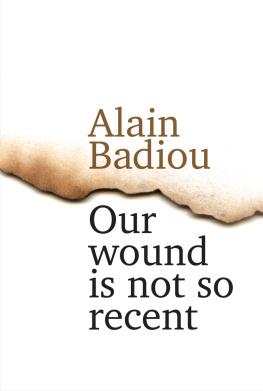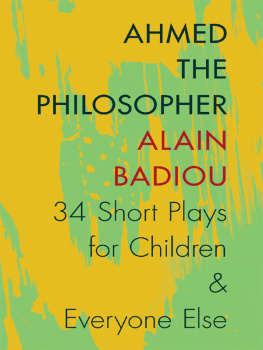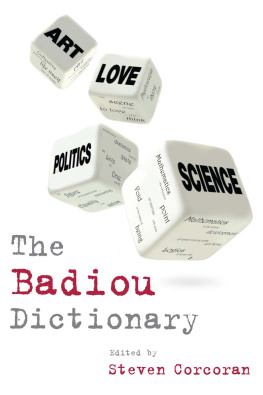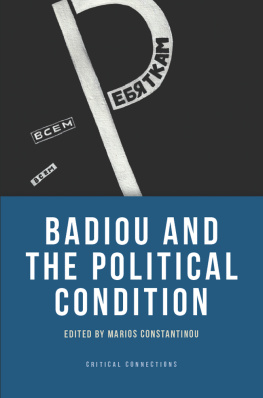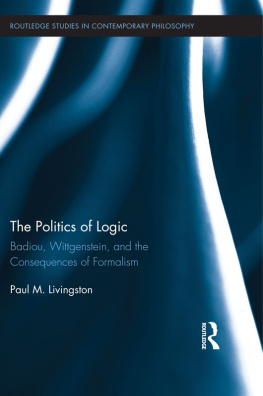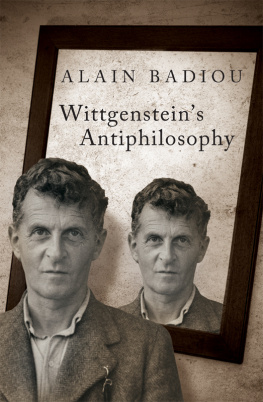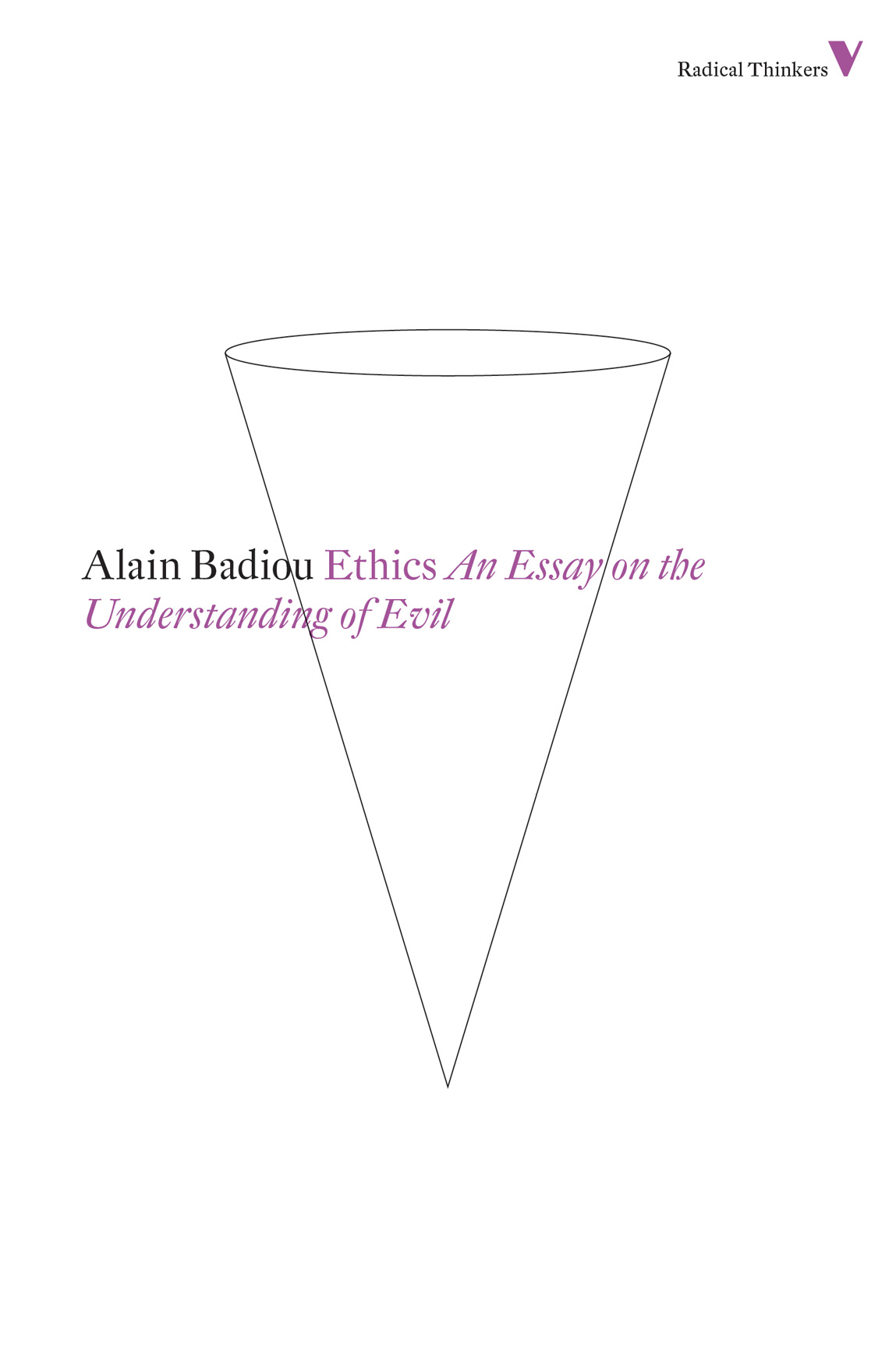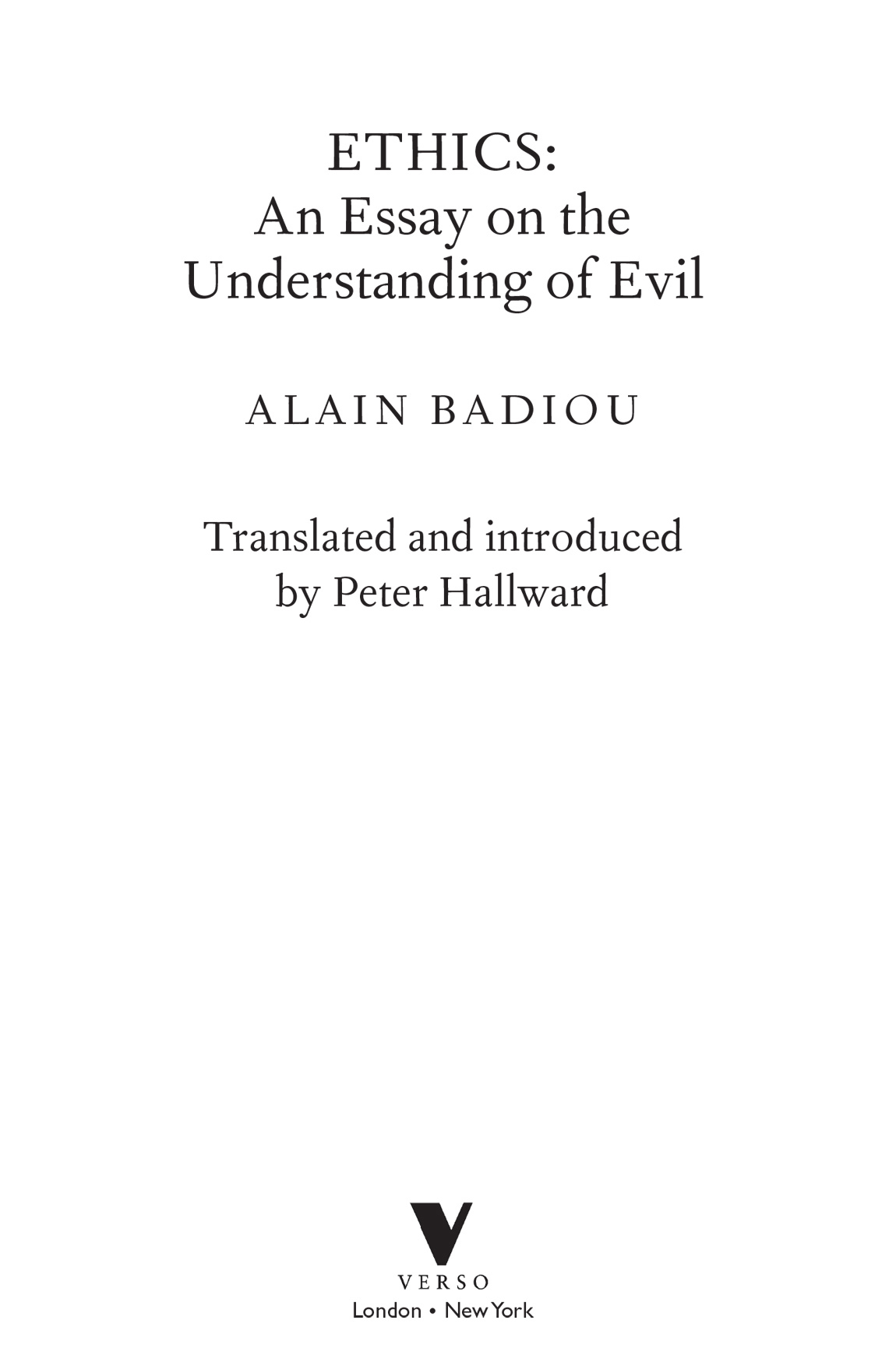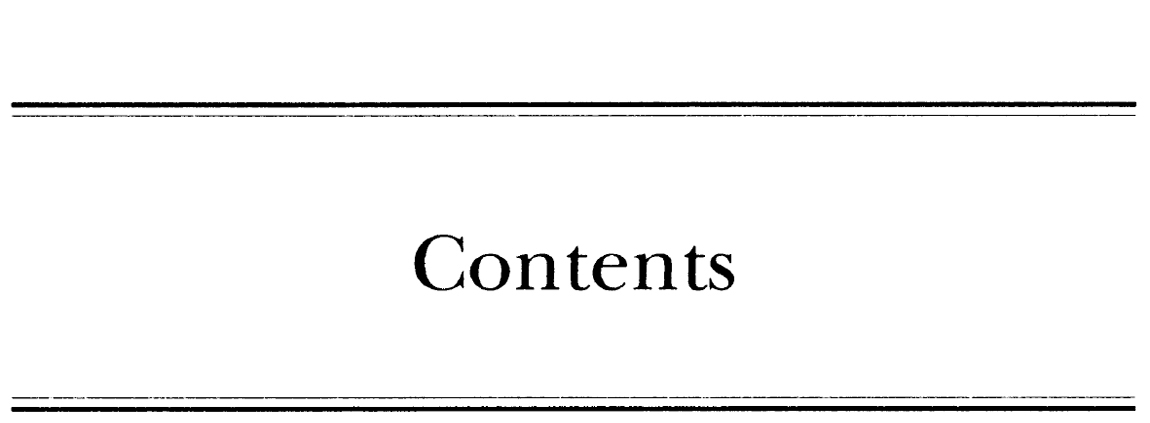This book is supported by the French Ministry of Foreign Affairs as part of the Burgess Programme, headed for the French Embassy in London by the Institut Franais du Royaume Uni

Published by Verso 2012
Verso 2012
First published in English by Verso 2001
Translation and introduction Peter Hallward 2001
First published as Lthique: Essai sur la conscience du Mal
Editions Hatier 1993
All rights reserved
The moral rights of the authors have been asserted
Verso
UK: 6 Meard Street, London W1F 0EG
US: 20 Jay Street, Suite 1010, Brooklyn, NY 11201
www.versobooks.com
Verso is the imprint of New Left Books
eBook ISBN: 978-1-78168-030-8
ISBN: 978-1-78168-018-6
British Library Cataloguing in Publication Data
A catalogue record for this book is available from the British Library
Library of Congress Cataloging-in-Publication Data
A catalog record for this book is available from the Library of Congress
v3.1
Intended for a general audience, and first published in a popular series of student-friendly engagements with major philosophical topics (time, art, responsibility, individuality ), this slender volume provides much the most accessible introduction to Badious admittedly complex and unusual thought.
Badiou is no longer a complete stranger among Anglo-American readers. Ethics is the third of his books to be translated into English (all within the past year), and his work has already been introduced, summarized and reviewed in a variety of places and ways. There is no need to duplicate such summaries in any detail here. But his work may remain just strange enough to warrant a brief overview of its general orientation, along with some explanation of the precise role played by ethics in his wider conception of things. This conception makes for profitable and provocative comparison with those of his better-known rivals in the field (Lvinas, Derrida ). I will end this Introduction by asking a couple of the more pressing questions raised by Badious intervention in this the most controversial field of contemporary philosophy.
I Badious project
Badiou is, by any criteria, one of the most significant and original philosophers working in France today, and perhaps the only serious rival of Deleuze and Derrida for that meaningless but unavoidable title of most important contemporary French philosopher. His attention ranges over a unique combination of fields and commitments: the mathematical theories of sets and categories, modernist poetry and art, radical politics, Lacanian psychoanalysis, contemporary theatre, and the history of philosophy from Plato and Parmenides to Lyotard and Lardreau. He has written more than twenty books, including several successful plays and novels. He edits the prestigious collection LOrdre Philosophique at Les Editions du Seuil, and is a professor at the Ecole Normale Suprieure in Paris and at the Collge International de Philosophie, where his lectures consistently draw hundreds of listeners.
Broadly speaking, Badious philosophy seeks to expose and make sense of the potential for radical innovation (revolution, invention, transfiguration ) in every situation. Simplifying things considerably, we might say that he divides the sphere of human action into two overlapping but sharply differentiated sub-spheres: (a) the ordinary realm of established interests and differences, of approved knowledges that serve to name, recognize and place consolidated identities; and (b) an exceptional realm of singular innovations or truths , which persist only through the militant proclamation of those rare individuals who constitute themselves as the subjects of a truth, as the militants of their cause.
The realm of knowledge is essentially static, objective, and structured according to the interests of those who dominate and govern the situation; every ordinary situation is structured in dominance, as Althusser would say. The sum total of these structurings namings, classifications, divisions, distributions make up what Badiou calls the state of the situation. (Badious use of the term state incorporates a classically Marxist understanding of the political state as much as it overlaps with a simple intuitive understanding of the status quo.) In an ordinary situation, the domination of its state is effectively absolute indeed, so absolute as to be beyond any precise measurement or determination. It is precisely this indetermination that ensures conformity or obedience from the (classified, divided ) members of the situation.
Access to the realm of truth, by contrast, is achieved through a procedure that succeeds both in fixing the domination of the state over the situation and in evading this domination. This procedure is wholly subjective: it is founded only on the subjects who bear its trajectory. A truth proceeds as a subtraction from the particularity of the known (from the classifications of the state). A truth is innovation en acte , singular in its location and occasion, but universal in its address and import. Inaccessible to the classifications of the state, the truth comes to pass as a universal-singular, particular to but unlimited by the contents of the situation in which it comes to exist.
Such a truth-procedure can begin only with some sort of break with the ordinary situation in which it takes place what Badiou calls an event. An event has no objective or verifiable content. Its happening cannot be proved, only affirmed and proclaimed. Event, subject, and truth are thus all aspects of a single process of affirmation: a truth comes into being through those subjects who maintain a resilient fidelity to the consequences of an event that took place in a situation but was not of it. Fidelity, the commitment to a truth, amounts to something like a disinterested enthusiasm, absorption in a compelling task or cause, a sense of elation, of being caught up in something that transcends all petty, private or material concerns. Subjects are both carried by a truth they compose the finite points of an always infinite truth and provide its literal, material support. Every subject is only an objective individual, an ordinary mortal, become immortal through his or her affirmation of (or transfiguration by) a truth that coheres at a level entirely beyond this mortal objectivity.
Truth for Badiou thus evokes the logic of being true to something, of holding true to a principle, person, or ideal. His examples include, in characteristically diverse registers: Saint Pauls militant conception of an apostolic subjectivity that exists only through proclamation of an event (the resurrection of Christ) of universal import but of no objective or established significance; the Jacobin or Bolshevik fidelity to a Revolutionary event which exceeds, in its subjective power and generic scope, the particular actions that contributed to its occurrence; two lovers conception of themselves as amorous subjects, rooted only in a fidelity to the ephemeral event of their encounter; an artists or scientists fidelity to a creative line of inquiry opened up by a discovery or break with tradition. In each case, what is materially composed by such truth-procedures is a generic set to which only the most disinterested (most universal, most anonymous) stuff of the situation belongs.


